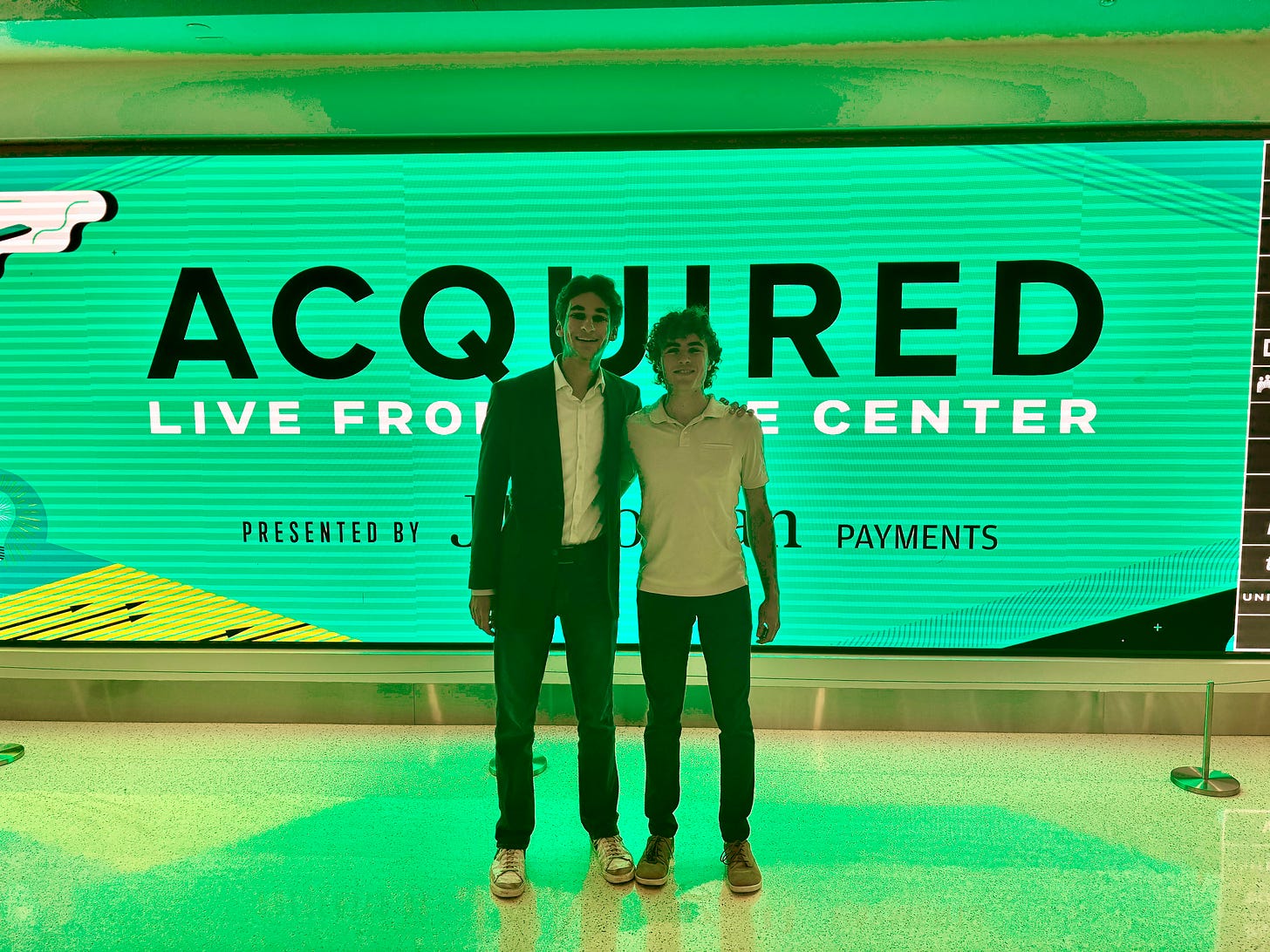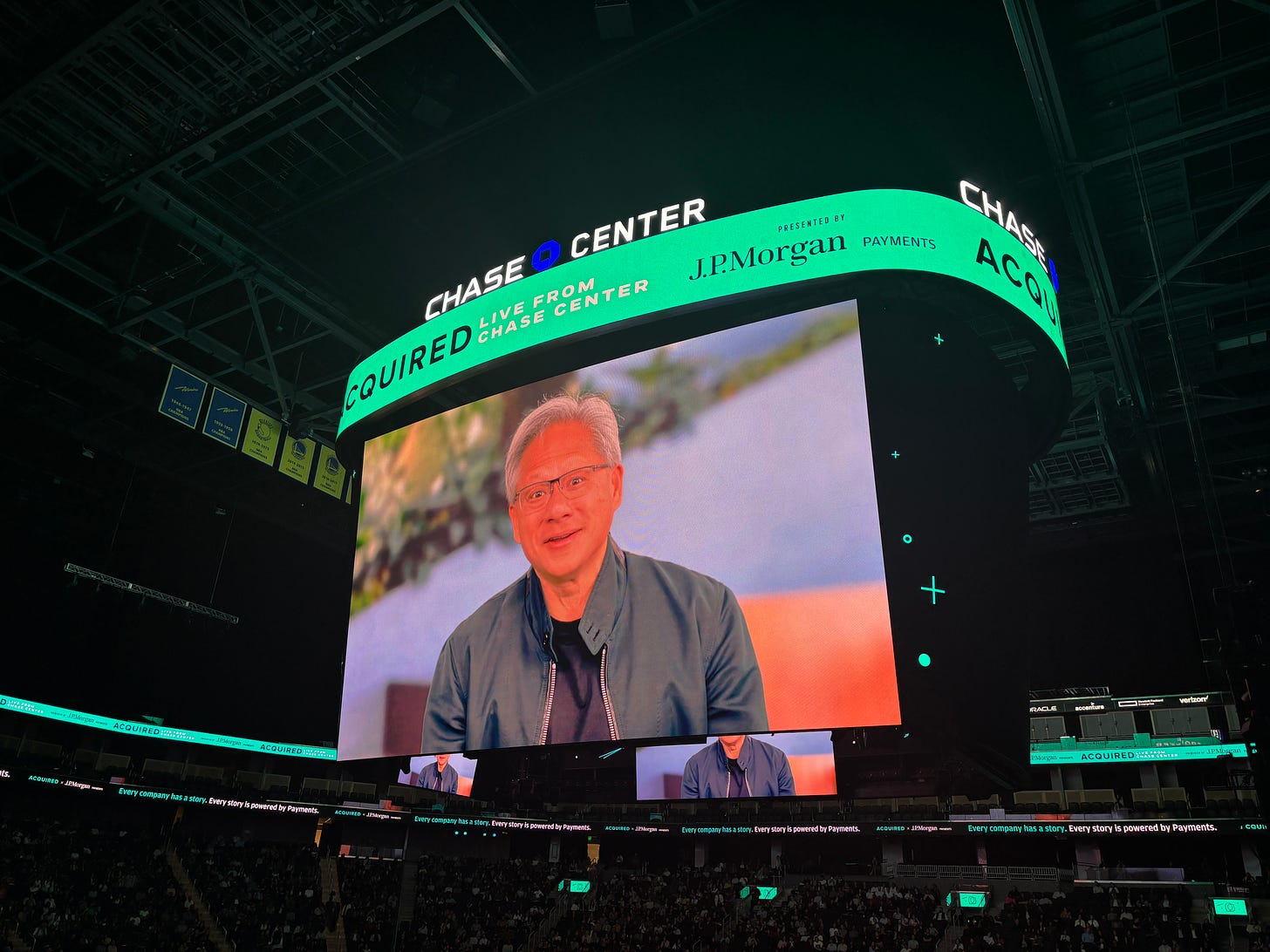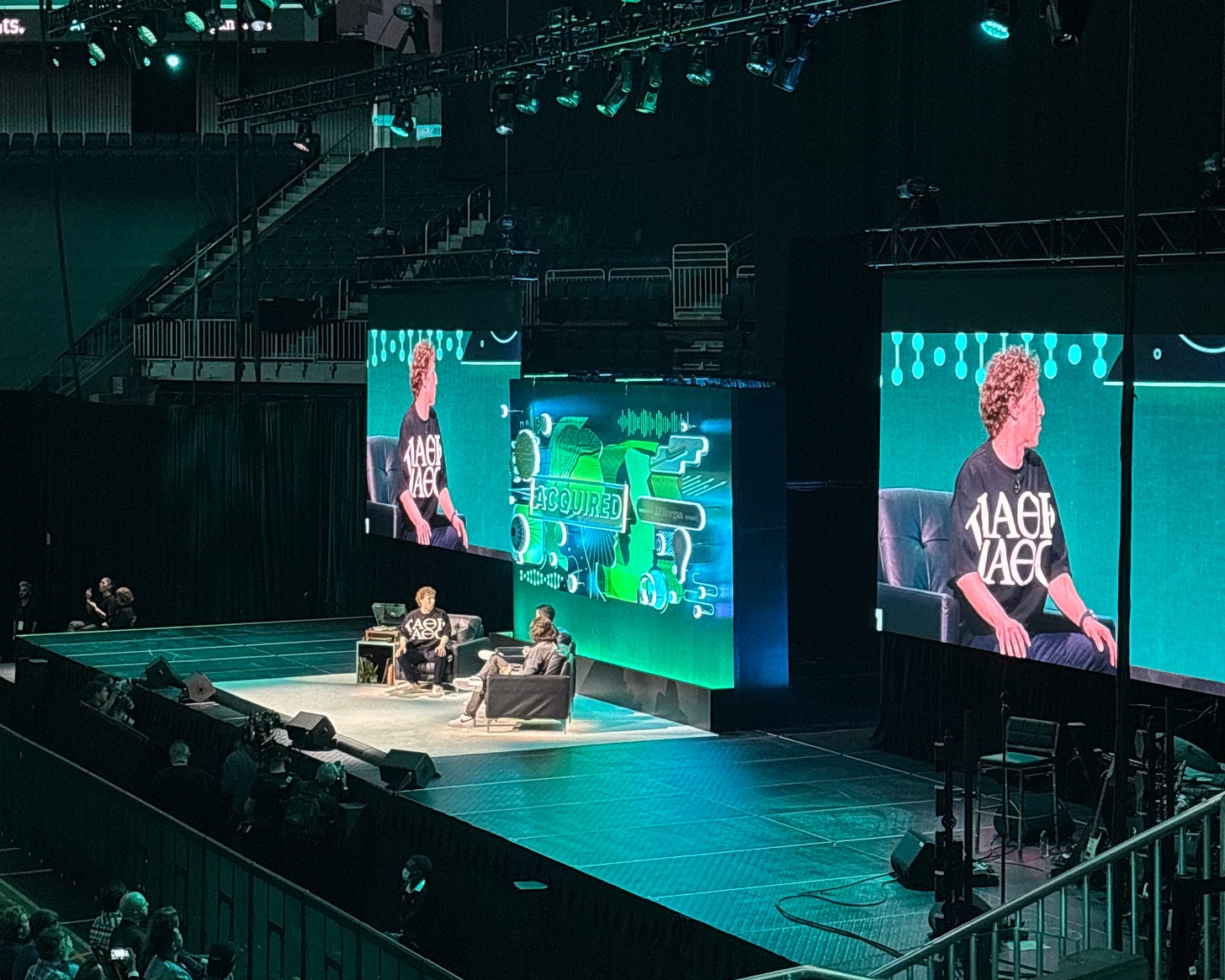Welcome back to Jeremi and Luca’s Newsletter, a weekly update from two friends connected by a relentless desire to learn.
Enjoy a closer look at what we’re reading, working on, and thinking about—from the small learnings to the large perspective shifts.
Jeremi: Listen Less
I turned and looked at Luca, an insight forming in my mind. But there was no time to share it. Mark Zuckerberg was talking again, so I turned and brought my attention back to the stage.
How did we end up here?
Luca introduced me to the Acquired podcast last May. The two hosts, David and Ben, do deep dives into different businesses, exploring their history and the playbooks that made them successful.
It’s one of several podcasts we’ve shared with each other in the realm of business. Business is a converging interest that we both have, and it’s a source of strength in our friendship. There are not many friends I have where we can talk for hours about random ideas and half-baked strategies.
A few months ago, we found out that this podcast, Acquired, would be hosting a live show in San Francisco with tickets costing only $50. And they would be interviewing Mark Zuckerberg.
At first, I was hesitant. I already had plans to travel up to San Francisco the week prior for the product management conference. Was I really going to buy another set of plane tickets to San Francisco for a 3-hour event?
It was Luca who pushed me to make it, as he often is. He knew the value that I could get out of this, and that of course it was worth it for $50. Not just to listen to Mark, but to meet other people who had similar interests to us. When Luca thinks something is valuable for me, he will tell me. Even if I don’t want to hear it.
So I bought the plane tickets and was committed. I had 18 hours in San Francisco to grab dinner with Luca, go to the live show, and meet up with friends and family in Berkeley.
There were many meaningful moments and conversations throughout the night, which made the trip worth it alone. But there were also some really interesting takeaways from listening to Mark.
I don’t think Mark Zuckerberg’s success is replicable (sounds obvious, but hear me out). My point is that his infamous slogan at Facebook: move fast and break things, which is seen as scripture in Silicon Valley, shouldn’t be immediately applied to our own situations.
As I was listening to Mark, it struck me that he wasn’t making his playbook out to be the work of a genius tactician. He was saying, “Look, I did things this way because it felt right for my situation. But there are many different ways to succeed, and I’m sure it could’ve been done another way.”
I think Mark’s advantage comes from his self-agency, and I think it’s a trait that most successful founders have in common. They learn from others and take advice. But they rely on their own critical thinking to decide what the right strategy is for their situation. Each do things in a different way.
But the point is, the “right” thing to do doesn’t come from following founder advice that everyone has heard. That advice worked for an entirely different company decades ago. The right decision comes from a deep understanding of the space you work in and the problem you’re facing. Then if the answer isn’t clear from your own experience, apply wisdom and knowledge from others.
Ultimately, Mark Zuckerberg made the right choice for a lot of important decisions at Facebook. He did so by being thoughtful and understanding his situation better than anyone else.
This is ironic, as Luca and I are big podcast listeners. We enjoy pulling wisdom and learnings from other people. But it’s a good reminder that personal experience beats external wisdom and that insights from successful people don’t mean much until you successfully apply them.
Luca: Think Less
At the Acquired live podcast, we also got a unique perspective from NVIDIA Founder and CEO Jensen Huang. Although Huang wasn’t able to join in person, he recorded a video to clarify a few points from when he was originally interviewed for Acquired.
When Acquired interviewed Huang for their episode on NVIDIA, they asked him, “If you knew what you know now, would you start NVIDIA all over again?”
His “absolutely not” answer ended up being taken out of context and going viral.
Of course, knowing how NVIDIA ultimately turned out, Huang said he would have started the company. But he initially answered the question with a “no,” and the excerpt below explains why:
“Building a company is insanely hard. The number of things you have to know, the amazing people you have to surround yourself with, the adversaries and all the smart things they’re going to do, and the adversities you’re going to be confronted with over time… if I were to take [the mountain of it], all the challenges and all the hardships and all the pain and suffering of the last 32 years and [compress] it into the brain of a 29-year-old, there is no way that person would have started the company. And my point there is your superpowers are partly your ignorance—you don’t know how hard it [will be].”
This perspective from Huang really struck me, particularly as I think about my current situation and endeavors. His reflection on the power of ignorance—of not fully knowing the immense challenges ahead—feels like a key lesson for anyone pursuing anything.
It raises an interesting question: How can I be more ignorant? Not in the sense of ignoring potential obstacles but in the sense of embracing action over overthinking. Often, overanalyzing every possible pitfall can paralyze progress. Huang’s insight suggests that by taking bold steps, even without knowing the full extent of the challenges ahead, we unlock the resilience and creativity needed to overcome them.
This idea of “thinking less and doing more” is super interesting. Maybe we don’t need to have all the answers, or even understand all the risks, to make something incredible happen. It may be that very ignorance that becomes our greatest asset.








Good insights Gentlemen!
Jeremi and Luca, what strikes me is how fruitful your friendship is - you both enjoy adventure in the skies and the mountains, and you share and stimulate one another intellectually in an exciting manner. It's a wonderful meeting of two keen minds!